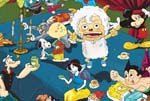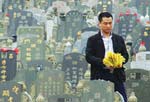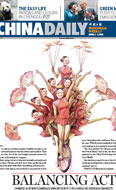Asia
Sea radiation another blow to Japan's fishermen
Updated: 2011-04-06 06:47
(Agencies)
TOKYO - Fishermen who lost their homes and boats in Japan's tsunami now fear radioactive water gushing into the Pacific Ocean from a crippled nuclear plant could cost them their livelihoods.
 A nightime lights imagery -- with the area around Sendai enlarged -- produced by the National Oceanic and Atmospheric Administration (NOAA) with data from US Defense Meteorological Satellite (DMSP), of Japan on March 12, 2011 after an earthquake and tsunami struck on March 11. [Photo/Agencies] |
The contaminated water raised concerns about the safety of seafood in the country that gave the world sushi, prompting the government to set limits for the first time on the amount of radiation permitted in fish.
Still, Japanese officials adopted the new standards as a precaution. And the mere suggestion that seafood from Japan could be at any risk stirred worries throughout the fishing industry.
"Even if the government says the fish is safe, people won't want to buy seafood from Fukushima," says Ichiro Yamagata, a fisherman who lived in the shadow of the Fukushima Daiichi plant. "We probably can't fish there for several years."
Fukushima is not a major fishing region, and no fishing is allowed in the direct vicinity of the plant. But experts estimate the coastal areas hit by the massive wave account for about a fifth of Japan's annual catch.
India announced Tuesday that it was halting food imports from Japan out of fear of radiation contamination. Few countries have gone so far, but India's three-month ban reflected the unease created by the nuclear crisis among consumers.
India said the ban would last three months or until the risk subsides. It planned to review the situation weekly.
Yamagata, whose home is within the 12-mile (20-kilometer) evacuation zone around the plant, is staying in a Tokyo soccer stadium with his wife and about 140 other refugees. He expects his fishing days are over.
After the magnitude-9.0 earthquake on March 11, he ran outside and watched the second floor of his house collapse, then fled with his family when tsunami warnings sounded.
Since then, he hasn't been allowed to return to check on the 5-ton boat he used to troll for flounder. He assumes it's gone, too. The tsunami killed up to 25,000 people and left tens of thousands homeless as it swamped about 250 miles (400 kilometers) of the northeastern coast and knocked out power to the plant.
Workers there have been desperately trying to cool down overheated reactors, but the effort has required spraying large amounts of water and allowing it to gush out wherever it can escape, sometimes into the sea.
Radioactivity will continue spewing into the air and water until cooling systems are restored.
The new limits on radioactivity in fish were imposed after plant operator Tokyo Electric Power Co announced water tested near the plant Saturday contained levels of radioactive iodine 7.5 million times the legal limit. That level had dropped to 5 million two days later.
Past readings were lower, but they were also taken farther from the plant, so the new readings did not necessarily mean that contamination was getting worse.
Japan said some fish caught last week about 50 miles (80 kilometers) from the plant would have exceeded the new limits, which may change as circumstances do.
The radiation standards for fish will be the same as for vegetables. After spinach and milk exceeded safety limits following the quake, health experts said people would still have to eat enormous quantities of tainted produce or dairy before getting even the amount of radiation contained in a CT scan.
Japan imports far more fish than it exports, but it sent the world $2.3 billion worth of seafood last year.
E-paper

Green mission
Tony blair believes China will take a leading role to fight climate change and cut emissions.
The spring of new professions
Real modern times
F1 sponsors expect returns from Shanghai stop
Specials

Have you any wool?
The new stars of Chinese animation are edging out old childhood icons like Mickey Mouse and Hello Kitty.

Fill dad's shoes
Daughter and son are beginning to take over the family business of making shoes.

Virtual memorial
High-Tech touches to traditional tombsweeping festival help environment.




